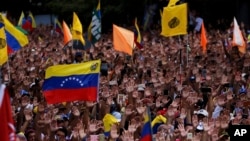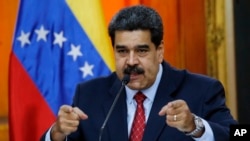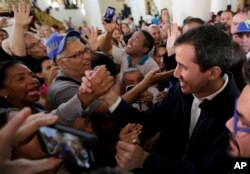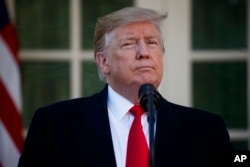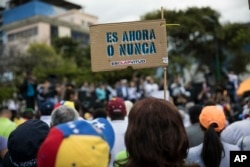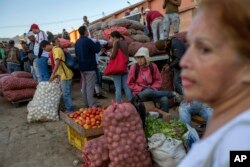Why are there two people claiming to be president?
The leader of Venezuela’s legislature, Juan Guaido, declared himself president on January 23, a direct challenge to the power of President Nicolas Maduro, who had been sworn in to a second term in office only two weeks ago.
Who is Maduro?
Maduro, a socialist, has been Venezuela’s president since he was first elected in 2013 after the death of his mentor and predecessor, Hugo Chavez. Maduro won his first election by a thin margin and was re-elected in a controversial poll in May, 2018, in which most opposition candidates were either prevented from running or boycotted the race.
Who is Juan Guaido?
Guaido was a relatively unknown politician until he was chosen by lawmakers earlier this month as a compromise candidate to lead the opposition-held National Assembly. The 35-year-old was elected to the National Assembly in 2011 and has been active in street protests against Maduro’s government.
Why has the political situation escalated now?
After Maduro was sworn into office in January for a second term, the National Assembly argued that the May 2018 election was not fair, and hence the presidency is vacant. Guaido said that in such cases in which the presidency is vacant, the constitution gives the head of the National Assembly the right to take over as acting president.
What has been the U.S. response?
U.S. President Donald Trump officially recognized Guaido as the legitimate president of Venezuela just minutes after Guaido said he was taking over as acting president.
Why did Trump decide to recognize Maduro?
The Trump administration has said the move was the only way to restore democracy to Venezuela.
Sanctions
The Trump administration has also imposed sanctions on Venezuela's state-run oil company, saying it wants to preserve the assets for the Venezuelan people. Treasury Secretary Steven Mnuchin said Maduro and his allies have long used the state oil company as a vehicle for corruption and embezzlement.
Why has Venezuela moved to the top of Trump’s foreign policy?
White House officials have said that Trump has long taken an interest in the situation in Venezuela. Following Maduro’s swearing in this month and renewed opposition protests against him, administration officials seized this opportunity to back efforts to remove Maduro from power.
What do US allies think?
Several countries have followed the U.S. lead and have recognized Guaido as president, including Canada, Brazil and Colombia. Some EU members have also said they would recognize Guaido if Maduro doesn’t announce new elections in eight days. U.S. Secretary of State Mike Pompeo has told members of the U.N. Security Council to "pick a side" in Venezuela.
What is Maduro doing now?
Maduro initially ordered the closure of the U.S. embassy in Caracas and the expulsion of all U.S. diplomats, but has since backed down. He has also rejected the ultimatum from a number of European countries that he hold new elections within eight days.
What comes next?
Guaido has called on Venezuelans to continue their demonstrations against Maduro until the country is liberated. While he has the support of the United States, Guaido and the National Assembly have little power in practical terms to take over the reins of government.
Where does the military fit in?
Both sides in the political dispute are vying for the support of Venezuela’s military. So far, the military has largely supported Maduro who has been giving them frequent pay raises in recent years. More than 20 national guardsmen broke with Maduro, seized an arsenal and declared themselves in rebellion, but were quelled by other units. Guaido has promised an amnesty to all members of the military who abandon Maduro.
What has happened to Venezuela’s economy?
Inflation is now running at 1.7 million percent — food and basic staples are scarce, and most Venezuelans are earning less than $10 a month. During the 20 years that Maduro and his predecessor Chavez have been in power, oil production has dropped by about a third, diminishing the main sources of income for the country. Government policies have helped to create shortages of basic goods, including food, fuel and medicine.
What does the crisis mean for everyday Venezuelans?
Venezuelans must contend with widespread shortages of food and medicine as well as regular power cuts. One of the biggest hardships in day to day life is hyperinflation, in which the prices of goods can double in just a few weeks, leaving people unable to afford food and other necessities.
What has happened to Venezuela’s population?
More than three million Venezuelans have left the country since 2014, according to the United Nations. A million of those who have fled have ended up in neighboring Colombia, while sizable populations have migrated to Peru, the United States, Ecuador, Spain, Argentina, Chile, Brazil, and Panama.
Where does Venezuela’s economy go from here?
Venezuela depends almost entirely on oil exports for hard currency, so the new U.S. sanctions against Venezuela's state-run oil company mean that the country will be able to purchase even less imports, including food.




